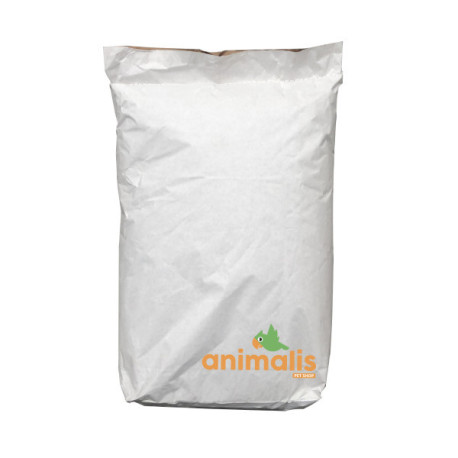- In the process of being restocked






Reference: 160504
Niger, birdseed rich in phosphorus and calcium. Niger seeds (or nyjer seeds) are fine seeds rich in oil. They come from Guizotia abyssinica (also known as Guizotia oleiferous). The niger is highly prized by most birds, goldfinches and siskins love it.
The seed is mainly grown in India, Burma, Ethiopia and Nepal. Niger is an oilseed with a high fat content (38-43%) and protein content (23%). It provides quality food for all species of wild and forest birds, both in dry and sprouted form.
Niger is one of the few birdseeds with a good ratio of calcium to phosphorus.
Niger, birdseed rich in phosphorus and calcium. Niger seeds (or nyjer seeds) are fine seeds rich in oil. They come from Guizotia abyssinica (also known as Guizotia oleiferous). The niger is highly prized by most birds, goldfinches and siskins love it.
The seed is mainly grown in India, Burma, Ethiopia and Nepal. Niger is an oilseed with a high fat content (38-43%) and protein content (23%). It provides quality food for all species of wild and forest birds, both in dry and sprouted form.
Niger is one of the few birdseeds with a good ratio of calcium to phosphorus.
A 100% natural product that is mixed with breeding or with food; It doubles in size by adding water.
Carrots are very rich in vitamins with a high proportion of vitamin A and carotene, as well as vitamin B, calcium and valuable carbohydrates.
Carrot seeds are very rich in vitamins with a high proportion of vitamin A and carotene, as well as vitamin B, calcium and valuable carbohydrates.
Clover stimulates the immune system and slows down cellular ageing through its excellent antioxidant properties. Rich in vitamins B, C, E and provitamin A.
Striated sunflower is the basic seed of any parrot mixture. It is also used in mixtures for parakeets and exotic doves.
It is also the favorite food of your outdoor birds during the winter period! Ideal for feeding the birds in your garden.
Practical information for giving sunflower seeds to birds in your garden:
Remember to regularly clean the feeders of your outdoor birds so that diseases and bacteria do not thrive.
Also consider setting feeders high up to prevent predators (such as cats, foxes, etc.) from targeting birds when they are eating.
Soybeans are an excellent source of iron, zinc, manganese, copper, selenium, potassium, vitamins, fiber, polyunsaturated fatty acids and antioxidants, in short, it is an excellent dietary supplement.
Soybeans are often used in sprouting seed mixes.
Flaxseed is rich in omega 3, which is essential for the cardiovascular system.
Niger, birdseed rich in phosphorus and calcium. Niger seeds (or nyjer seeds) are fine seeds rich in oil. They come from Guizotia abyssinica (also known as Guizotia oleiferous). The niger is highly prized by most birds, goldfinches and siskins love it.
The seed is mainly grown in India, Burma, Ethiopia and Nepal. Niger is an oilseed with a high fat content (38-43%) and protein content (23%). It provides quality food for all species of wild and forest birds, both in dry and sprouted form.
Niger is one of the few birdseeds with a good ratio of calcium to phosphorus.
Thanks to its small black or pretty electric blue seeds, the poppy is recognizable among thousands. A cousin of the poppy, the poppy is known for its content of good fats and micronutrients essential for the proper functioning of the body.
Flaxseed is rich in omega 3, which is essential for the cardiovascular system.
Baked and crumbled wheat biscuit.
Rusk is particularly suitable for the absorption of moistened food.
Also ideal for mixing additives (vitamins, dyes, etc.) in food products
Ideal for moistening egg pie.
Composition: wheat, water, salt and yeast.
Chia is a sage. It is an annual plant that can reach 1 m in height, and its scientific name is Salvia hispanica.
The composition of the chia seed closely resembles that of other mucilaginous seeds like flaxseed and psyllium. Unlike flaxseed, chia does not have anti-nutritional factors, which limit the use of flaxseed without prior heat treatment. The anti-nutritional factors are cyanogenic glycosides or linatins, inhibitors of vitamin B6 that prevent its action. Chia also has a much more pleasant taste than flaxseed, and birds are more willing to consume it.
Birds like to remove the shells from peanuts and then eat the peanuts. Peanuts are a source of energy, which is very important for the long winter months.
Unpeeled peanuts can be given to parrots as a treat.

Niger, birdseed rich in phosphorus and calcium. Niger seeds (or nyjer seeds) are fine seeds rich in oil. They come from Guizotia abyssinica (also known as Guizotia oleiferous). The niger is highly prized by most birds, goldfinches and siskins love it.
The seed is mainly grown in India, Burma, Ethiopia and Nepal. Niger is an oilseed with a high fat content (38-43%) and protein content (23%). It provides quality food for all species of wild and forest birds, both in dry and sprouted form.
Niger is one of the few birdseeds with a good ratio of calcium to phosphorus.
